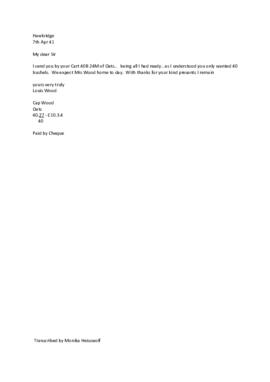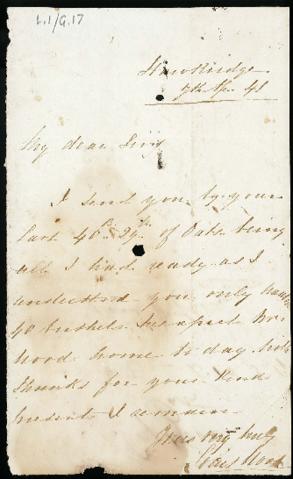Identity area
Reference code
Title
Date(s)
- 1841 (Creation)
Level of description
Item
Extent and medium
1 letter
Context area
Name of creator
Biographical history
John Leake (1780-1865) was born in Kent, U.K., in 1780, son of Robert and Sarah Leake. The family were merchants connected with the firm of Travis and Leake of Hull and John worked as a shipping and cargo agent, trading in various commodities between Hamburg, Hull, and North Sea and Mediterranean ports. In Hull in 1805 he married Elizabeth the daughter of a Hull merchant, William Bell, and between 1806 and 1819 they had six sons and two daughters, but one daughter died in childhood. After the Napoleonic Wars Leake and his family settled in Hamburg, an important trading centre and home for many British merchants, where he acted as agent for a number of East Yorkshire and German business companies, especially in agricultural produce, linseed oil, whale oil, cotton, etc. In the 1820s and 1830s, however, business began to decline and many of the Anglo-German merchant community emigrated. Leake was encouraged by William Wilberforce and the British consul in Hamburg to emigrate to Van Diemen's Land and he and his family sailed from Leith in 1822 and arrived in Hobart in 1823. The family settled near Campbell Town in the Midlands where many other former merchants of Hamburg and Altona (Holstein) settled, including Lewis Gilles and the Oakden and Milliken families etc. Others, later settled in South Australia, including Osmond Gilles and two of Leake's sons, Robert and Edward. Leake still kept in touch with friends and relatives in Hamburg and Hull. Former business associates acted as Leake's agents for the sale of wool and other business, especially Leake's father-in-law William Bell of Hull and his son, William Bell jr. Leake's father-in-law left property in Hull, in the street called "Land of Green Ginger", in trust for the education of Leake's son John Travis Leake as a surgeon, the residue for Bell's daughter Elizabeth Leake and then for Elizabeth's other children (see L.l/D.277-99). John T. Leake studied medicine in Kiel and Dublin and later received an MD. from Kiel University. William Bell the younger offered to educate a younger son, Arthur, and teach him the merchant business, so he was sent back to Hull and spent some years there and also in Hamburg with his other uncle Edward John Bell. One of Edward Bell's daughters, Clara, came to live with the Leakes in 1857 and in 1869 married the youngest son, Charles. Bell's son Ernst joined Robert Leake at Glencoe for a few years and then settled at Mt. Drummond near Port Lincoln, South Australia. Another son, Edward Geiss settled in Queensland, and after their father's death the youngest sister, Helen, came out to join the Leake family at Campbell Town in 1878.
Name of creator
Biographical history
Captain William Wood, (1778- 1863) born at Hastings, England, buried at St Andrews Anglican Cemetery, Longford, Tasmania. Captain Wood served with a British Expeditionary Force in the West Indies and was present at the capture of the French island colony of Guadeloupe where he met and married his wife Marie Hyacinthe Genevieve de Gouges the only child of General Pierre Aubrey de Gouges, late Governor of French Guiana. Wood retired from the Army in 1824 after selling his commission for £1,800. Two years later he and his wife and five children emigrated to Van Diemen's Land under an inducement of the offer of land to retired military men. The family arrived at Hobart Town on 25 October 1829 aboard the brig, Mary Anne. Captain Wood took up a grant of 2,000 acres at Snakes Bank, now Powranna, and named his property Hawkridge after the family manor near Tiverton in Devon. He applied for a further grant of 2,000 acres and in time he had increased the size
Pageant / by G. B. Lancaster published by Endeavour Press in 1933 (Morris Miller-Fisher College Rare-Book PR 9619.3 .L321 P3 1933a) Is said to be the story of the Woods family with Captain Wood portrayed as Captain Comyn.
Immediate source of acquisition or transfer
Bequest of Dorothy Foster in 1964. Additional items given by J. Hudspeth in 1978
Content and structure area
Scope and content
Undated letter regarding 40 bushels of oats
Appraisal, destruction and scheduling
Accruals
System of arrangement
Conditions of access and use area
Conditions governing access
May be consulted
Conditions governing reproduction
This item is in the public domain. When reusing this material, please cite the reference number and provide the following acknowledgement: “Courtesy of the UTAS Library Special & Rare Collections”
For assistance please contact Special.Collections@utas.edu.au
Language of material
Script of material
Language and script notes
Physical characteristics and technical requirements
some material mould damaged
Finding aids
Original inventory and descriptive notes can be found at https://eprints.utas.edu.au/10860/
Existence and location of originals
Existence and location of copies
Related units of description
Alternative identifier(s)
Access points
Subject access points
Place access points
Name access points
Genre access points
Description identifier
Institution identifier
Rules and/or conventions used
Status
Level of detail
Dates of creation revision deletion
HE May 2018
Language(s)
Script(s)
Sources
Digital object metadata
Latitude
Longitude
Media type
Text
Mime-type
application/pdf



